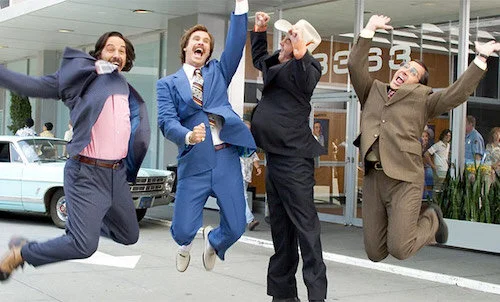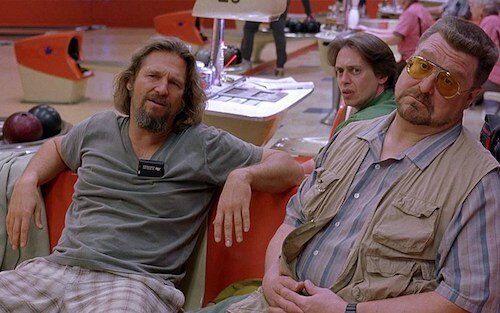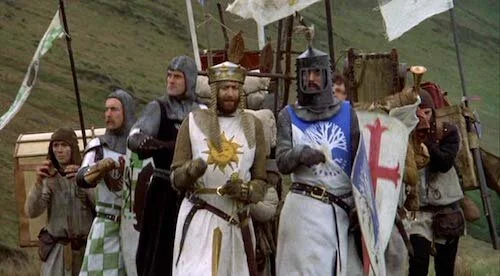Comedy is Subjective: Are Funny Movies Great Movies?
When I wrote about The Jesus Rolls the other day, I got to talking with acquaintances about The Big Lebowski. Like I said in that article, I don’t particularly find that film to be a masterpiece, but I do consider it an incredibly funny film. With much back-and-forth discussing, today’s topic was finally brought up, and I couldn’t resist but to try and pick it apart. Does a funny film that succeeds in making you laugh a great film? What separates hilarious comedies that are strong films from ones that are just funny?
For me, this becomes completely and entirely subjective. You have obvious examples like a Some Like it Hot or an Annie Hall, but these are works that have intriguing stories or clever takes on how these stories are told. I’m talking about just funny films. It has to be subjective. The first question that comes to mind are whether or not the jokes fall flat for you. Since a number of straight forward comedies put their jokes at the forefront of their priorities, this has to matter. If I don’t laugh a single time during Ace Ventura, then the film is a flat out failure for me, simply because it’s a film made to make people laugh before anything else. If Dumb and Dumber does make me laugh, that’s the Jim Carrey film I am drawn towards. It achieved what it was made to do.
The Big Lebowski
However, we can’t just claim that every film we don’t find funny is poorly made, and that’s where the real discussion comes in. Have I found mediocre films funny? Absolutely. Even if the comedy aspect is the main priority and the narrative takes a bit of a tumble as a result, there are still important factors that go into a film, like editing, acting, and more. A film can be funny but poorly assembled, thus being a fun time that’s not necessarily a good film. A great comedy for me is A Fish Called Wanda, and even if I don’t find a part of the film funny (as hard as I laugh throughout the majority of it, I don’t find the “interrogation” climax as hilarious as most), there’s still a clever narrative at play here, upheld by fantastic performances.
Let’s look at a less solid film. Anchorman is quite flat as a story, but you’re not really here for that. You want to watch Ron Burgundy have a meltdown over his career, and all of the oddities that the news stations get up to. So do I. I don’t care for Anchorman as a story, but it’s a go-to if I need to laugh. It’s not a poorly made film, either. The characters are well acted, the editing punctuates a number of the jokes, and there’s a definitive, constant vibe throughout that has helped Anchorman become a pop culture statement.
Monty Python and the Holy Grail
So, what has been a perfect straight-up comedy for me? I’m excluding specific satires, screwball films, dramedies, or obscure, meta comedies (so no Charlie Kaufman here). One example is Monty Python and the Holy Grail. What renders this film better than Anchorman for me? Is the story really that much better? Well, I would argue no. However, for me personally, it is better. Why? I get more out of this mockery of medieval tales and feature films than I get out of Anchorman’s zany news teams, and not just laughs wise. At the end of the day, when it comes to films that put comedy first, I feel your choices are entirely based on which films not only make you laugh, but speak to your overall sense of cultural awareness the most. Young Frankenstein might be funny for you, but I bet it would be even funnier if you know more than just the references. If parodying the Golden Age of Hollywood — and its monster flicks — is up your alley, then Young Frankenstein will be a goldmine for you.
If you really want to compare the best made comedies of all time, then it’s a completely different conversation. Play Time is the greatest series of visual gags and spoofs, with every shot being a whole new joke. Being John Malkovich is a highly intellectual, existential take on hilarity. Dr. Strangelove is the archetypal political satire. The General is brilliantly choreographed, as to not kill Buster Keaton. These are all comedies that have pulled off major achievements in pushing the capabilities of cinema, storytelling, and joke delivery.
Anchorman doesn’t need to be this. Neither does The Big Lebowski. At the end of the day, for the films we put on just to have a good laugh, it’s about what is up our alley, and who we can share these guffaws with. That’s why some of these works have staying power. People can quote The Big Lebowski for days on end, and have the punchlines become a part of their daily regiments. Discussing Anchorman with friends can remind you of parts that had you keeling over and in tears. Replace these sentences with the films of your choice, and it all makes sense to you. Is it fair to place personal straight-comedies amongst other classics? Sure, as long as we remember these lists are personal, and not declared statements you must follow. Whatever you feel right about.
I don’t think putting The Big Lebowski high on constructive lists about innovative films works for me. As a comedy, I find His Girl Friday or Charade to be more compelling, interesting, and connective for many reasons. As a film, it falls flat compared to whatever other films I may be pitting it up against (‘90s, all time, even Coen brothers films). As a work that makes me laugh? Straight up? It’s definitely a favourite of mine. That doesn’t make it a great film, but it also doesn’t have to be in order to succeed in brightening my day. Sometimes, that’s all films need to do: serve a single purpose. It doesn’t render them masterpieces to me, but not everything has to be.
Andreas Babiolakis has a Masters degree in Film and Photography Preservation and Collections management from Ryerson University, as well as a Bachelors degree in Cinema Studies from York University. His favourite times of year are the Criterion Collection flash sales and the annual Toronto International Film Festival.




